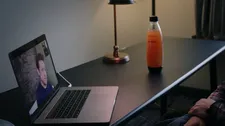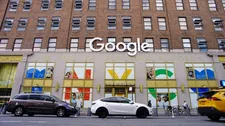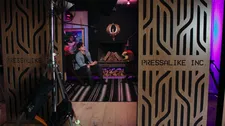 |
| The YouTube Effect |
A year after screening at Tribeca, Alex Winter’s documentary The YouTube Effect is finally hitting cinemas. It’s a smart and very thorough look at the evolution of a media giant, and if anything the delay has made it more relevant, in light of the big changes currently happening in the online world. A few days ago, Alex and I got together to discuss it, and he began by reflecting on his own internet journey.
“I first got online in the early Eighties, in the early days of dial-up when you stuck your phone line into the back of your Mac classic. So it does go back aways, and for me, I've always been most interested in the rise of online community. And in those days, it was BBSs and newsgroup sites, pre web, and then AOL and then Napster and so on. And that's kind of what led me to the YouTube doc, was just reaching this kind of nexus point where the number one search engine in the world is Google and the number two is YouTube, and they're both owned and run by the same company. So you're talking about one company that has most of the world's eyeballs, and that's just beyond unprecedented. It's almost unimaginable in its power. And it's not all negative. They do an enormous amount of good. But I really thought it was high time that somebody took a deeper look at Google and YouTube's media front end, which is YouTube.”
 |
| The YouTube Effect Photo: Brian Lundy |
It seems incredibly timely now. Alex has recently started using Mastodon and BlueSky as Twitter is collapsing.
“I think that what's happened with Twitter is a is a really stark example of how things can go wrong, and how dangerous and destructive they are when they go wrong,” he says. “This is something that I've been examining since the Silk Road doc I made on the dark net. We were talking about Tor, and why there needed to be a hidden end of the internet and how once a bad actor got their hands on a massive technology then it would be very unsafe for people. And I think that's what we've seen happen with Elon’s takeover of Twitter, which has become very unsafe for many groups that he attacks like, you know, LGBTQ people. He's going after trans people very hard, and he's pretty brazenly anti-democratic, as we go into an election year.
“These are dangerous problems. YouTube obviously doesn't have an agenda the way Elon does. I think it's more of a financial agenda, more of a basic capitalist agenda, and so they're monetising all of their content, including the hate speech and the incitement to violence. So I think that's where there's an issue but, you know, I think that we're at a point where regulation, antitrust law, anti monopoly legislation is going to become imperative, because I don't think any of these companies are going to police themselves at the end of the day.”
I tell him that I like his film partly because it’s so refreshingly nuanced. People are always trying to hold up social media as wonderful or condemn them as terrible, and it’s not really an either-or thing.
He agrees. “I think that it's not, as you said, an either-or. I would say it's not even a mixed bag, to the degree that it's just society. That's all it is. It's not an algorithm. It's not a technological issue. It's not about switches or circuits that you can turn off. It's not about code that you can just rewrite to make everything utopian. These platforms are nothing but a massive congregation of society, and it operates the way any congregation of society does, which is it operates for good and it operates for ill. So I think it's more about a level of understanding and acceptance, and also just being honest.
 |
| The YouTube Effect Photo: Jon Hokanson |
“Everyone I know who uses technology is on it all the time. They're usually on it when they're pooh-poohing it. ‘Oh, I hate these platforms that I'm currently on, communicating with you!’ You know, which is funny to me on a certain level, but the reality of it is, is the technological revolution is here, it's not going anywhere. It's just an advancement and an evolution of human society, it's not an other or a separate thing that we can pretend isn't here. And that's really how I've come at all of my tech stories, because that's just how I see this moment that we're in.
“I think that things will actually not get better until more people who have come up with these technologies start to come into power, because I think they have no problem understanding that these tools are largely good and useful, and also that they're not going to not use them. And I think it's that generation that's going to enact the changes that we need. I think the older generation has a hard time wrapping their heads around the fact that this isn't an either-or issue.”
He mentions in the documentary that YouTube is the centre of the online world for many young people – the first place they turn to for information.
“I'm not even that young anymore!” He laughs. “I mean, I have kids that are now grown, that came up on YouTube. And so that wasn't a shift. And now they're adults, out of college and in the world, and they're still on all the time. I think, again, YouTube is a media platform that is often misrepresented or ignored because it's so vast that people can't really get their heads around it. So they focus on Meta or Twitter, which seem more understandable, but I think that when you're dealing with a platform like YouTube, which is all of the world's news, all of the world's media, and a social media platform, and a DIY platform, and a self-contained entertainment platform, and a propaganda tool, I think – and a search engine, which it is, because most of my kids use that over Google to search, I just think it's really hard for people to grasp the scale. How pervasive and broad this tool is, I mean, it's almost like a Swiss army knife for everything. I just think that that's going to get bigger, not smaller, as time goes on.”
 |
| The YouTube Effect Photo: Kristy Tully |
I tell him that I recently saw a documentary about Umberto Eco in which the author opines that the purpose of memory is twofold – to store information and to filter out the junk – and that the problem with substituting the internet for our memory is that it has no ability to select based on quality.
“I think that may be the case to a degree, but I don't think that's the primary issue,” he says. “I think the primary issue is just a straight up capitalist issue, where you have a platform that has risen and because there's no other mechanism in place for a business model, they applied a TV ad-based model to it. But it's not a TV. And it has a has a much broader set of tools than a TV or a newspaper. But the way that it functions is dollars are attached to content, and they make more money the more content is viewed, and we've known from time immemorial – certainly before Pulitzer invented yellow journalism – that people gravitate towards negative, salacious and hate-filled and inciting content, provocative content, over other content. So when you connect that finance mechanism to a media platform as fast as YouTube, then you're going to have problems. And that's not an algorithm issue. It's not even a technology issue. It's just a business issue.”
It also feeds into celebrity culture, so as we come towards the end of our allotted time, i ask him how he tracked down the various YouTube celebrities interviewed in his film.
“Well, you know, I'm old. So I've been around a while and I've watched YouTube rise. I was mentoring the Fine Brothers when they got onto the platform at the very beginning, and I've known the Smosh guys for many years, and many other influencers on YouTube I've known for many, many years. So a lot of these were relationships that I already had and then I went after people that I was very impressed with, that I thought would have good things to say, like Natalie Wynn from Contrapoints, who I just think is extraordinary. I just built a cast of people that I thought would be interesting and kind of interconnected in a way, and feel like kind of an ensemble.”





















